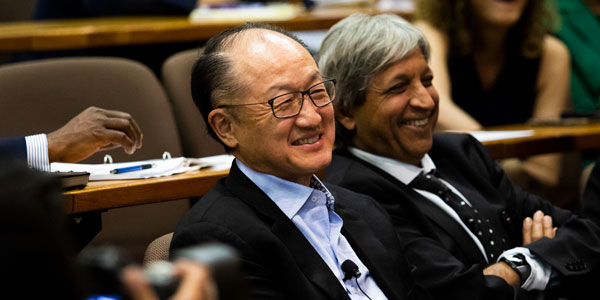World Bank President worried about SA
- Wits University
Stunted growth in children, high broadband costs and human capital investment in South Africa worries the World Bank.

The President of the World Bank Jim Yong Kim delivered a public lecture at Wits during his visit to the country and engaged with the audience about the work of the Bank. During the discussion themed The Human Capital Crisis: Building a New Social Contract, Kim argued that there are three critical issues that countries need to address in order to eradicate poverty.
Countries need to build digital economies for inclusive growth, foster resilient societies and invest more effectively in people, said Kim.
In answering the question about building inclusive digital economies, Kim said the key is in investing in basic and relevant infrastructure.
African governments are focussing on the wrong infrastructure.
“Every head of state (in Africa) that I have ever seen says we on the path to industrialisation and we want to build infrastructure for industrialisation. But if that’s not the path that is open, then what is the right infrastructure? Almost for sure broadband seems to be the right infrastructure.”
South Africa needs to bring down the cost of data in order to build an inclusive digital economy, he said.
According to Kim, e-commerce has uplifted poor communities in China through joint ventures between government subsidies and business subsidies.
Poor health and education impacts economic growth
The health and education of the population directly impacts the economic prospects of a country.
Although South Africa has managed to decrease child mortality the country still has high levels of stunting among children, according to the Human capital index released by the World Bank.
South Africa ranked 127 out of 156 in the index and stunting was recorded at 27% and is a crisis in a country that has some of the best resources in the world, lamented Kim.
Stunting is impaired growth and development that children experience due to poor nutrition, repeated infection, and inadequate psychosocial stimulation, according to the World Health Organisation (WHO). Children are defined as stunted if their height-for-age is more than two standard deviations below the WHO child growth standards median.
A physician and anthropologist by training, Kim argued that “in some countries the percentage of children who are stunted and have had terrible education will be the source of instability”.
He urged governments to invest more in human capital. “There has to be a political cost in not investing in people,” he said.
“There are so many different things that you have identified as a country that you want to tackle. This issue of human capital, everyone in this country has to take some responsibility.”
Kim concluded his talk by saying that young people must not trust anyone over age of 30 years to determine their future. Young people must get militant and demand investment in education and health; and must do everything to ensure “that every South African child has the opportunity to become what they want”.

